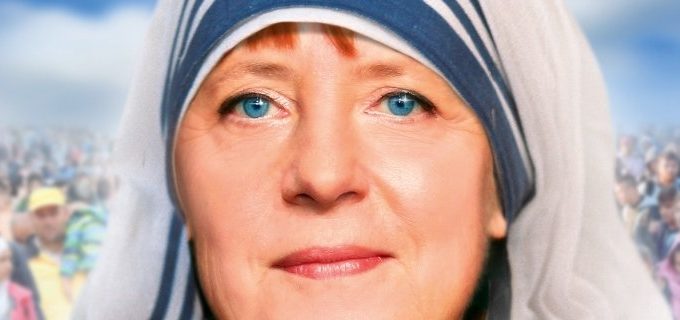
Mutter Angela’s spirituality
Angela Merkel’s recent response to a question about fear of Europe’s increasing Islamisation sparked a media frenzy condemning her as a naïve traitor, or praising her as a compassionate angel.
The German weekly Der Spiegel depicted her as a misguided saint, a reincarnated ‘Mutter Theresa’, who was trying to transform Germany into a moral superpower in Europe’. The rational, deliberate Merkel was becoming emotion-driven and error-prone, the weekly argued.
Meanwhile, The Economist of Britain praised the ‘political courage of Angela Merkel who told her people to set aside their fear of immigrants and show compassion to the needy’. Its article concluded: ‘The politics of fear can be trumped by the politics of dignity. Mrs Merkel understood this; so should the rest of the world.’
Courage
What was it she actually said while in Bern to receive an honorary degree? (See video with English subtitles here.)
Merkel: Fear has never been a good adviser, neither in our personal lives nor in our society. Cultures and societies that are shaped by fear, will without doubt not get a grip on the future. Of course we have this debate that many Muslims also have, whether Islam even belongs to Germany or not. When we have four million Muslims in (Germany), it’s really not debatable whether Muslims belong to Germany but Islam doesn’t, or whether Islam also belongs in Germany.
I see there are concerns, but I have to say to we all have chances and liberties to practice our own religion as well. I don’t suggest someone who practices Islam is at fault for that.
We should have the courage as Christians to enter a dialogue then. While we are talking about tradition, please go to church every once in a while, or become a bit more versed in the Bible, maybe be able to explain a painting in the church, or at least be able to explain what the meaning of Pentecost is. I just have to say that a lot of people’s knowledge about the Christian Occident leaves a lot to be desired.
To complain about how Muslims know more about the Koran than they do about the Bible, I find that very curious. Maybe this debate will make us want to go back, and encourage us to gain more knowledge about our roots.
So far I find this debate extremely defensively-minded. Sure one has to prepare against the terrorist danger, but let us all also not forget just how rich European history is of dramatic and gruesome conflict and war. We should be really careful when we complain if somewhere else something bad is happening. Sure, we have to stand up against that, but we have absolutely no ground to stand on, to show haughty arrogance towards others, and I have to say that as the Chancellor of Germany.
A truly remarkable statement: ‘We… as Christians…’! Shouldn’t the chancellor be ‘neutral’ in her comments? Shouldn’t she respect the separation of church and state? Of course, if she had said, ‘We… as humanists…’, no-one would have raised an eyebrow. Those who claim on the basis of separation of church and state that politicians should not be able to speak from their own worldview or perceptions of reality–or spirituality–seem to think that values are neutral.
Taboo
Values stem from our understanding of reality. For Christians, that means our understanding of Ultimate Reality and of human nature: God and humans created in his image. Belief in no God or gods, and in humans as accidents of ‘slime plus time’, will lead to other values. As John Gray says, humanists are simply Christians in disguise when they claim value and dignity for humans, yet take God out of the picture.
Historically, Judeo-Christian spirituality has primarily shaped Europe’s values. Sorry, but Greek and Roman worldviews simply did not include humans created in the image of the biblical God on which our concepts of human dignity and human rights are based.
Merkel challenges Christians to engage in debate with other worldviews, including Islam; to learn more about our roots, to go the church more, to learn more about the Bible and European history. She defends the open society where there is room for different views and openness for dialogue with respect. She breaks the taboo on linking spirituality and politics.
As did Robert Schuman seventy years ago. He too was branded a traitor when he proposed–during the war–that he and his fellow Frenchmen would have to learn to love and forgive the Germans to rebuild Europe! Yet on that very basis, drawn from his personal Christian spirituality, the European project broke through the vicious cycle of revenge to produce seven decades of peace.
We need to follow the chancellor’s example in speaking about the relationship between spirituality and politics. To that end, we plan to hold the first annual Schuman Symposium on spirituality and politics on December 1, in the Chapel of the Resurrection in Brussels. More about that soon.
Till next week,
Jeff Fountain

This Post Has 0 Comments